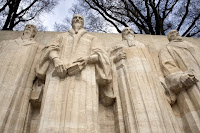 (article cited from apologetics.org titled "Prominent Atheist Professor of Law and Philosophy Thomas Nagel Calls Intelligent Design Scientific and Constitutional to 'Mention' in Science Classes")
(article cited from apologetics.org titled "Prominent Atheist Professor of Law and Philosophy Thomas Nagel Calls Intelligent Design Scientific and Constitutional to 'Mention' in Science Classes") Prof. Thomas Nagel, a self-declared atheist who earned his PhD. in philosophy at Harvard 45 years ago, who has been a professor at U.C. Berkeley, Princeton, and the last 28 years at New York University, and who has published ten books and more than 60 articles, has published an important essay, "Public Education and Intelligent Design," in the Wiley InterScience Journal Philosophy & Public Affairs, Vol. 36, issue 2, on-line at
http://www3.interscience.wiley.com/journal/118493933/home (fee for access US $29.95).
Prof. Nagel's paper is a significant and substantial opening, at America's highest intellectual level, that encourages all intelligent, educated, informed individuals — particularly those whose interest in this issue derives from intellectual curiosity, not the emotional advocacy excitement for any side — that it is legitimate as a matter of data, science, and logic, divorced from all religious texts and doctrines, to consider that intelligent design may be a valid scientific approach to understanding how DNA and the complex chemical systems of life came to attain their present form. Prof. Nagel's article is well worth the price to put it in the library of any inquiring mind.
As anyone who has watched TV's Crime Scene Investigation knows, scientific investigation of a set of data (the data at the scene of a man's death) may lead to the conclusion that the event that produced the data (the death) was not the product of natural causes — not an accident, in other words — but was the product of an intelligence — a perpetrator.
But of course, the data at the crime scene usually can't tell us very much about that intelligence. If the data includes fingerprints or DNA that produces a match when cross-checked against other data — fingerprint or DNA banks — it might lead to the identification of an individual. But even so, the tools of natural science are useless to determine the "I.Q." of the intelligence, the efficiency vs. the emotionalism of the intelligence, or the motive of the intelligence. That data, analyzed by only the tools of natural science, often cannot permit the investigator to construct a theory of why the perpetrator acted. The mental and conscious processes going on in the criminal's mind are outside the scope of the sciences of chemistry and physics.
Thus it is obvious that scientific methods can lead to the conclusion that an intelligence did something, even if those same methods cannot tell you who specifically did it, or why they did it. Everyone who has read or watched a Sherlock Holmes story knows this.
Prof. Nagel applies this principle to the evolution/intelligent design debate. Assuming, for purposes of argument, even though he himself is an atheist, to label the intelligence "God," he says "the purposes and intentions of God, if there is a god, and the nature of his will, are not possible subjects of a scientific theory or scientific explanation. But that does not imply that there cannot be scientific evidence for or against the intervention of such a non-law-governed cause in the natural order" (p. 190). In other words, Sherlock Holmes can use chemistry to figure out that an intelligence — a person — did the act that killed the victim, even if he can't use chemistry to figure out that the person who did it was Professor Moriarty, or to figure out why Moriarty did the crime.
Therefore, Prof. Nagel says, it potentially can be scientific to argue that the data of DNA and life points to an intelligent designer, even if science cannot tell you the identity of the designer or what is going on in the designer's mind.
The Professor then turns to whether any of the intelligent design proponents actually are presenting such a scientific argument. After all, just because it is theoretically possible that someone might present such a scientific argument doesn't mean that any particular individual currently is actually doing that.
Professor Nagel has read ID-supportive works such as Dr. Behe's Edge of Evolution (p. 192). He reports that based on his examination of their work, ID "does not seem to depend on massive distortions of the evidence and hopeless incoherencies in its interpretation" (pp. 196-197). He reports that ID does not depend on any assumption that ID is "immune to empirical evidence" in the way that believers in biblical literalism believe the bible is immune to disproof by evidence (p. 197). Thus, he says "ID is very different from creation science" (p. 196).
Prof. Nagel tells us that he "has for a long time been skeptical of the claims of traditional evolutionary theory to be the whole story about the history of life" (p. 202). He reports that it is "difficult to find in the accessible literature the grounds" for these claims.
Moreover, he goes farther. He reports that the "presently available evidence" comes "nothing close" to establishing "the sufficiency of standard evolutionary mechanisms to account for the entire evolution of life" (p. 199).
He notes that his judgment is supported by two prominent scientists (Marc Kirschner and John Gerhart, writing in the Oct. 2005 book Plausibility of Life), who also recognized that (prior to offering their own theory, at least) the "available evidence" did not "decisively settle[]" whether mutations in DNA "are entirely due to chance" (p. 191). And he cites one Stuart Kauffman, a "complexity theorist who defends a naturalistic theory of emergence," that random mutation "is not sufficient" to explain DNA (p. 192).
Prof. Nagel acknowledges that "evolutionary biologists" regularly say that they are "confiden[t]" that "random mutations in DNA" are sufficient to account for "the complex chemical systems we observe" in living things (p. 199) — but he disagrees. "Rhetoric" is the word Professor Nagel uses to rejects these statements of credentialed evolutionary biologists. He judges that the evidence is NOT sufficient to rule out ID (p. 199).
He does not, however, say that the evidence compels acceptance of ID; instead, some may consider as an alternative to ID that an "as-yet undiscovered, purely naturalistic theory" will supply the deficiency, rather than some form of intelligence (p. 203).
In light of these considerations, Prof. Nagel says that "some part of the high school curriculum" "should" include "a frank discussion of the relation of evolutionary theory to religion" but that this need not occur in biology classes if the biology teachers would find this too much of a "burden" (p. 204). Significantly, Prof. Nagel — who is a professor of law as well as a professor of philosophy — concludes that, so long as the proposal is not introduced by religiously-motivated persons "as a fallback from something stronger," but by persons "more neutral" or "without noticeable religious beliefs," it would be constitutional to "mention" ID in public school science classes, because doing so genuinely furthers "the secular purpose of providing a better understanding of evolutionary theory and of the evidence for and against it" (p. 203). He makes clear that the "mention" must be a "noncommittal discussion of some of the issues" (p. 205).
He acknowledges the prevailing attitude in the mainstream science community is that ID represents a "fundamentalist threat," fearing that allowing even a noncommittal discussion of ID in science classes could lead to the fundamentalists gaining the power to suppress "the right to teach evolution at all" (p. 205). He also acknowledges the possibility that students who arrive in class with religious objections to evolution already in mind may seize on the mere mention of ID as a basis for "build[ing] much more than is warranted" from that favorable mention (p. 204, quoting Kent Greenawalt’s Does God Belong in Public Schools?).
But to Prof. Nagel, these fears are not sufficient to bar, as a matter of constitutional law, the accurate statement, in public school science classrooms, that intelligent design, while possibly wrong, is a scientific approach to the question of how DNA and the complex chemical structure of life came to achieve its present form (pp. 204-205).
Prof. Nagel makes clear his right, as an intelligent, educated a "layman" (p. 199), to judge for himself the evidence that random mutation is a sufficient explanation for DNA and the complex chemical systems of life. He rejects any rule that well-educated, intelligent laymen such as himself must simply accept the assertions of the leading evolutionary biologists that the evidence in favor of evolution disproves intelligent design. Using his informed judgment, he rejects the claim that the scientific data "decisively" disproves intelligent design. He, an atheist, says that as a matter of science, intelligent design could possibly be correct. And he says it would be constitutional to say as much in a public school science class.
For all those who, like myself, have some education in science (at MIT while earning a bachelor of science in architecture, I earned As and Bs in physics, chemistry, calculus, introductory astrophysics, and ecology), have maintained a lifelong interest in science, and who became interested in this issue out of their intellectual curiosity about science, Professor Nagel's conclusion both is very refreshing, and really rather obvious.
The mainstream science community's crusade against fundamentalism seems unnecessary in the eyes of persons such as myself, who never encountered any fundamentalists at any point in grade school, high school, university, and thereafter, nor in my children's education. When I interested myself in the data, my heart was empty of both a fear of fundamentalism, and a longing for fundamentalism. Prof. Nagel has approached the data with the same freedom from bias.
Perhaps fundamentalism is a stronger force than my experience reveals. But that should be irrelevant to the scientific analysis of data. The emotionalism which scientists have brought to this issue since before the Scopes Trial, even if directed against a real, rather than imaginary target, has introduced a non-scientific motivation into the hearts of evolutionary biologists that has biased and rendered unreliable their evaluation of the data, especially the relatively recent data concerning DNA and molecular biology.
Moreover, those who are convinced that we are not-very-far-descended from troupes of apes that engage in group dominance struggles should monitor themselves for the possibility that they are engaged less in a search for truth than in a search for dominance. An Achilles' Heel of modern science is the satisfying sense of pride that comes from having successfully dominated the people around you. Its origin is from the apes and its goal is to flatter emotion, not to facilitate reason.
 On October 31, 1517, a young monk named Martin Luther nailed ninety-five theses to the castle church door in Wittenberg, Germany. He addressed the abuses of the sale of indulgences and this event proved to provide the catalyst for the Protestant Reformation. In an era when the Gospel had been eclipsed by a system of human merit, Martin Luther, John Calvin, and the other magisterial reformers proclaimed to the people of God that we are declared righteous in the sight of the Lord through faith alone in the person and work of Christ Jesus.
On October 31, 1517, a young monk named Martin Luther nailed ninety-five theses to the castle church door in Wittenberg, Germany. He addressed the abuses of the sale of indulgences and this event proved to provide the catalyst for the Protestant Reformation. In an era when the Gospel had been eclipsed by a system of human merit, Martin Luther, John Calvin, and the other magisterial reformers proclaimed to the people of God that we are declared righteous in the sight of the Lord through faith alone in the person and work of Christ Jesus.















